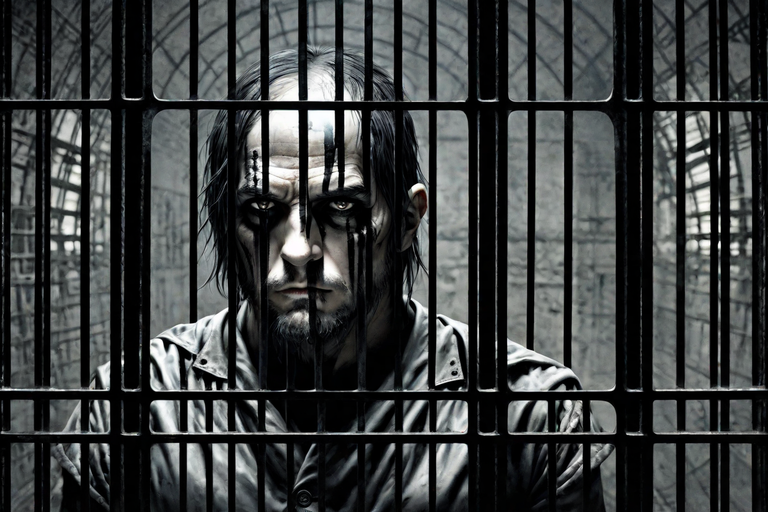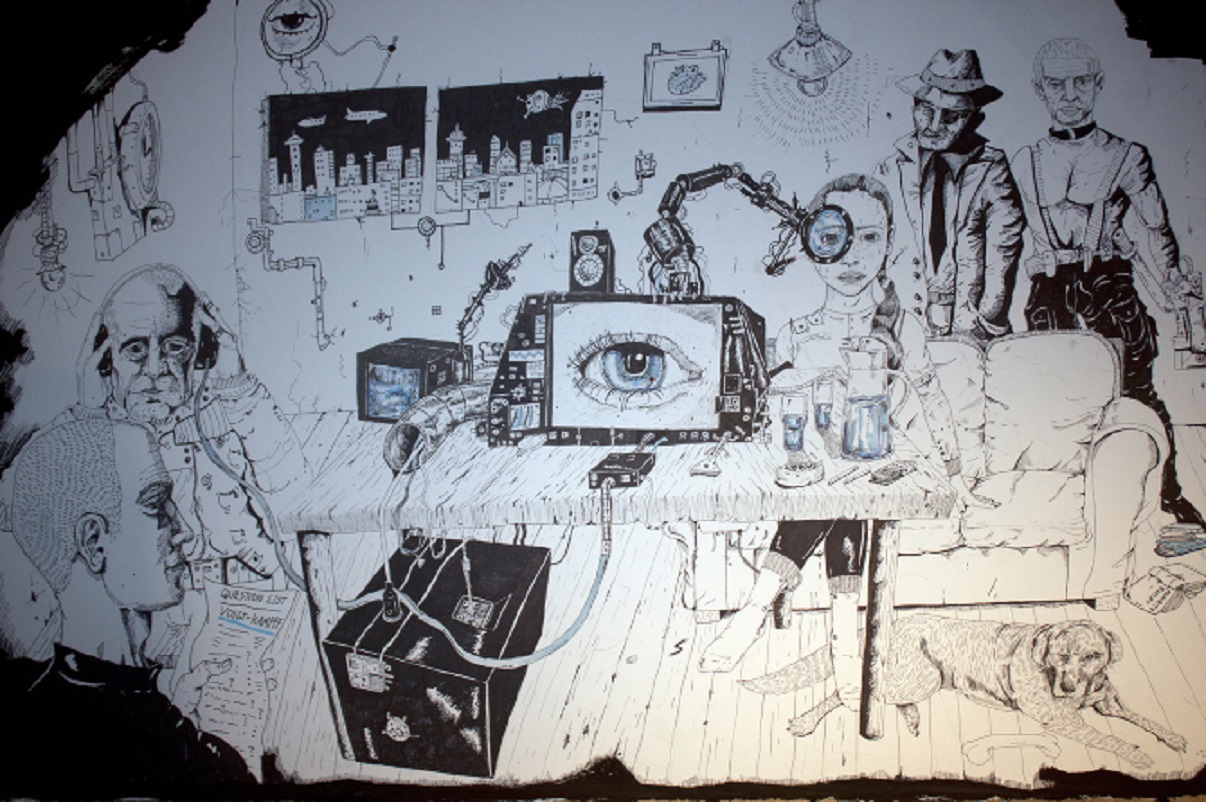If we are to live in the Known World – the world that is made up of known things – then we have to do something first, something we all know how to do instinctively but which we can’t allow ourselves to know anything about. We have to put the conditions in place whereby stuff can be known, and at the same time we can’t see that we’re doing this because that would detract from the effect (just as a conjurer can’t allow his conjuring tricks to be visible if he wants to put on a good show). The KW doesn’t come into being ‘all by itself’, after all; it has to be set up in advance – it’s the output of a mechanical process.
What this mechanical process (this ‘thing that we do’) is can be very easily explained – in order for us to be able to have the experience of living in the Known World, the world that is made up of known things, we first have to frame everything. We do this by creating a point of reference that stands outside of the world that is to be investigated, and then measure everything that happens there in terms of this reference point. Nothing that is ‘unreferenced’ can ever be allowed to get past the system of checks that is the rational mind. This is how we obtain the Known World; this is the only way we can obtain the KW.
The naive response would be to count this ‘knowing’ of ours as a great and mighty accomplishment, since the idea of living in a world that is unknown to us is very far from being a pleasant one. We can’t actually see how this could even be possible – how can we possibly operate within a world that we can’t model, a world which we can’t create some kind of theory of? We can’t see how we can exist in a world without having an abstract overview of that world, in other words. We can’t see the benefit of having no map, no idea or theory about what’s going on – we’d be left feeling our way around in the dark, completely at the mercy of our environment. We say that we need an overview therefore, but then – as we’ve just said – in order to have a map, or in order to have an overview, we first have to have ‘an inviolable external reference point’, an immutable constant to measure everything against, and this brings its own set of consequences.
What we’re looking at here is the ‘Unmoved Observer’ spoken of by Robert Hughes – the Unmoved Observer is ‘the hook on the wall on which everything is hung’, and what this means is that if the hook is unmoved (and unmoving) then so too must be whatever is being hung from that hook. The Known World only gets to be ‘the Known World’ because the picture frame that holds it has been secured to a fixed point of reference; if the picture wasn’t fixed in the same way that the hook is then there would be no ‘knowing’. ‘Fixing is knowing’, therefore – we can’t know something that we can’t nail down, which is obvious enough. We can’t know anything unless we first frame it.
If there is ‘a force that moves but is itself not moved’ then what this means is that this force functions as an autocrat – it imposes its own brand of order upon the world whilst at the same time not allowing itself to be influenced in any way by the world. This is the situation of ‘the rule’ and ‘the domain to which that rule is applied’ – everything is one-sided here and if everything wasn’t one-sided then the rule wouldn’t be able to function as a rule anymore. It can’t work both ways. Rules have to be abstracted from the Whole in order to exist; there aren’t any rules in the Whole, after all! Were a rule to allow itself to be influenced by its environment then it would in this case be part of the world rather than determining the world (rather than ‘saying what the world is’) and so it would no longer be able to serve as an ‘ordering factor’. The rule can only say what things are (or what the world is) when the world in question totally agrees with that rule in the first place, when the world that is being scrutinised perfectly reflects that rule, and so this is the situation where ‘the rule is the world and the world is the rule’. This is the ‘Type-2 Deterministic Universe’, Philip K Dick’s BIP; this is the simulation within which the only type of freedom available is ‘simulated freedom’.
The world as it is in itself is completely irrelevant to the rule, to the picture hook, to the Unmoved Observer. It couldn’t be more irrelevant seeing as how the only way the rule can acknowledge or register a datum is when it matches the format within which it assumes that datum must come. This is like the joke Amit Goswami tells about the motorist who has lost his car keys late at night and is pacing back and forth under the street lamp, searching away frantically. The joke – if we may go straight to the punchline and avoid the actual joke itself – is that the keys were lost nowhere near the streetlight, but the motorist reasons that it’s better to search under the lamp because the light is better there. This illustrates the absurdity of trying to use rationality to understand the world, according to Amit Goswami.
The trade-off that we’re talking about here is simple therefore – we can either search in the dark, where we can’t see anything (but where also where the keys actually are) or we can search in the light (where we can see very well, but where the sought after keys aren’t). This is exactly how it is in real life too; it’s the very same trade-off we’re looking at here and we make the very same choices that the motorist in the joke does – we opt to live in the world which we can know (and be known ourselves) even though there’s no reality in it, rather than living in the world which we can’t know, but which isn’t real. So if we think that the motorist in the joke is one hell of a big fool, then what does that say about us?
When we live in a world that is obedient to the abstract rule, obedient to how we want it to be, then we bring a curse down upon our heads. The curse is that we get to inhabit a VR Domain where the only thing that exists are mere appearances, appearances that have nothing behind them, and where we ourselves are mere appearances too. This is of course only what we would expect in a VR world – I become an appearance in a World of Appearances and the only way this is going to work for me at all is if I make very sure to live in a very shallow way, if I make a point of never examining anything. This is the secret to living in a VR world that is made up entirely of hollow illusions when we don’t want to know that we are. The secret is just to get on with it, to never disobey the rule, to never examine what it is that we have taken to be true. If something is ‘accepted as true by the collective’ then that’s the end of the matter – we won’t look any further. The Known World – if it is to maintain its apparent integrity – has to be a ‘philosophy-free zone’, in other words; this is the Kingdom of the the Wilfully Dumb, or, as Chogyam Trungpa puts it, it is the world (or loka) that is associated with the Principle of Intelligent Stupidity.
According to thought, stuff is real only when it matches the inviolable presumptions it has made regarding what constitutes <real> and <not real>. This is the rational mind’s conceit, and we very rarely challenge it on this. The way things actually work is in completely contrary to this however, which is to say, we can only come across what is real when we find the courage to doubt or disobey thought and go looking somewhere else instead (somewhere that isn’t an extension or reflection of an assumption that we have made and then promptly forgotten about). The real isn’t handed to us on a plate, by some teacher or kindly official; as Noam Chomsky says, if it’s the truth we want then we have to investigate things for ourselves and not listen to anyone else, no matter what their standing, no matter what qualifications they hold. This is the one job that we absolutely can’t farm out to anyone else; to let some group of people determine ‘what reality is for us’ is the ultimate irresponsible act – this is what gives rise to the circle of fools’. We’re told that disobeying the established rules and regulations is the ‘irresponsible thing’ but it isn’t -what’s irresponsible is never questioning them. What’s irresponsible is going along with them. What’s irresponsible – as P.D. Ouspensky says – is our obedience not our disobedience.
We could say that the trade-off is all about fear (in that we are too afraid to venture out from the safe but sterile pseudo-world that thought or society has provided for us), or we could say that it’s all about greed, since we can only possess that which can be known, that which we can be made concrete, that which we point to and say to ourselves ‘this is definitely real’. If I am an appearance then I can only relate to other appearances and this is a hollow game as we have said – to encounter anything that is actually authentic, anything that has actual depth, I first need to be willing to go beyond the image or idea I have of who I am, and this is another way of saying that I have to be OK about being uncoupled from the Guidance System which is the thinking mind. According to the system itself, such an uncoupling would reckless in the extreme; this would – our thoughts tell us – constitute the most disastrous thing we could ever do, just like jumping heedlessly off a sheer cliff to our certain death on the jagged rocks below.
We could also say that we are ‘attached to the scaffolding of thought and will resist being separated from it to the very limit of our ability. Thought (or the structure which thought creates) is our prison, but it’s a prison that we are attached to, a prison that defines us, a prison that tells us who we are, and for this reason we don’t ever want to leave it. That’s the very last thing we ever want to do. The prison in question doesn’t just tell us ‘who we are’ – this mind-created identity of ours doesn’t exist ‘in a vacuum’, as it were – it tells us what everything is. Nothing escapes explanation (or rationalization) in the Known World – not even the tiniest little thing – and this is why it’s a prison.
Image – wallpaperaccess.com






